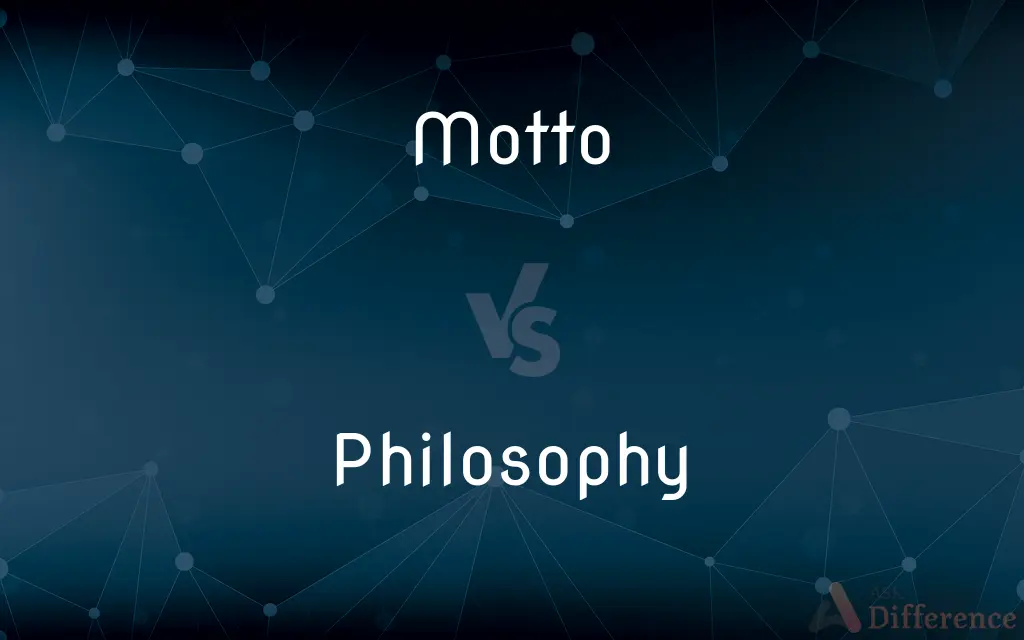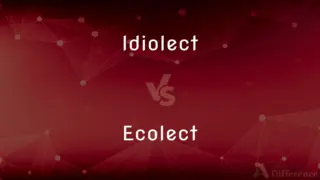Motto vs. Philosophy — What's the Difference?
By Maham Liaqat & Fiza Rafique — Updated on March 13, 2024
A motto is a succinct phrase expressing a guiding principle, while philosophy is a broader system of beliefs or ideas about life.

Difference Between Motto and Philosophy
Table of Contents
ADVERTISEMENT
Key Differences
A motto is a brief statement that encapsulates a guiding principle, belief, or ideal, often used by individuals, organizations, or countries to reflect core values and inspire action. On the other hand, philosophy is a comprehensive system of ideas and beliefs about the nature of the universe, life, and morality. It delves deeper into existential questions and the underlying principles governing thought and behavior.
Mottos are usually concise and memorable, designed to be easily recalled and serve as a beacon or rallying cry. For instance, a school might adopt the motto "Excellence through effort" to promote hard work among its students. Whereas, philosophy encompasses a broad range of theories and principles, such as existentialism or stoicism, which offer in-depth explanations of the world and guidelines for living a meaningful life.
While a motto can be adopted and understood quickly, often serving as a practical reminder in daily life, philosophy requires contemplation and study to grasp its complexities and nuances. A company's motto like "Innovation for everyone" instantly communicates its commitment to making innovative products accessible, while its philosophy might involve a detailed approach to innovation, including how it values creativity, inclusivity, and sustainability.
Mottos tend to be static and unchanging, providing a constant source of inspiration or motivation. Conversely, an individual’s or society’s philosophy can evolve over time, influenced by new experiences, knowledge, and societal changes, reflecting a more dynamic approach to understanding life.
Mottos and philosophies both play important roles in shaping actions and attitudes but operate at different levels of abstraction. While mottos offer immediate clarity and focus, philosophies provide a broader, deeper foundation for understanding and navigating the complexities of life and morality.
ADVERTISEMENT
Comparison Chart
Definition
A succinct phrase expressing a guiding principle or ideal.
A system of beliefs or ideas about the fundamental nature of life, the universe, and everything.
Purpose
To inspire, motivate, and guide behavior with a concise statement.
To provide a comprehensive framework for understanding life, ethical values, and the universe.
Complexity
Simple and easily understandable.
Complex and requires deep thought and study.
Changeability
Often remains constant over time.
Can evolve with new insights and understandings.
Application
Used by individuals, organizations, and nations for inspiration or identity.
Guides individual behavior, ethical decision-making, and theoretical inquiries.
Compare with Definitions
Motto
A brief, powerful statement used to express a guiding principle.
Live and let live encapsulates a philosophy of tolerance.
Philosophy
A comprehensive system of beliefs about the nature of the world and our place in it.
Stoicism teaches the importance of virtue, tolerance, and self-control.
Motto
A personal creed that helps focus intentions and actions.
Be the change you wish to see in the world encourages personal responsibility for social change.
Philosophy
An academic discipline that explores fundamental questions of existence, knowledge, and ethics.
Philosophy examines what we can know about the world and ourselves.
Motto
A slogan adopted by a family, country, or company to reflect core values.
E pluribus unum signifies unity in diversity for the USA.
Philosophy
A framework for ethical living and moral decision-making.
Utilitarianism is a philosophy that prioritizes the greatest good for the greatest number.
Motto
An encapsulated ideal that serves as a constant reminder of one’s values.
Knowledge is power emphasizes the value of education.
Philosophy
A set of guiding principles or beliefs that influence actions and attitudes.
Her philosophy of continuous improvement drives her career advancement.
Motto
An easily remembered phrase that represents an organization's or individual's ethos.
Just do it motivates action and determination.
Philosophy
A personal or organizational approach to life and decision-making.
His philosophy of 'living simply so others may simply live' guides his choices.
Motto
A motto (derived from the Latin muttum, 'mutter', by way of Italian motto, 'word', 'sentence') is the general motivation or intention of an individual, family, social group or organization. Mottos are usually found predominantly in written form (unlike slogans, which may also be expressed orally), and may stem from long traditions of social foundations, or from significant events, such as a civil war or a revolution.
Philosophy
Philosophy (from Greek: φιλοσοφία, philosophia, 'love of wisdom') is the study of general and fundamental questions, such as those about existence, reason, knowledge, values, mind, and language. Such questions are often posed as problems to be studied or resolved.
Motto
A short sentence or phrase chosen as encapsulating the beliefs or ideals of an individual, family, or institution
The family motto is ‘Faithful though Unfortunate’
Philosophy
The study of the fundamental nature of knowledge, reality, and existence, especially when considered as an academic discipline.
Motto
A phrase which recurs throughout a musical work and has some symbolical significance
They were developing the use of leitmotifs or mottoes that appear throughout an opera
Philosophy
A theory or attitude that acts as a guiding principle for behaviour
Don't expect anything and you won't be disappointed, that's my philosophy
Motto
A brief statement used to express a principle, goal, or ideal
“We explain that when someone is cruel, or acts like a bully, you don't stoop to their level—no, our motto is ‘when they go low, we go high'” (Michelle Obama).
Philosophy
The study of the nature, causes, or principles of reality, knowledge, or values, based on logical reasoning.
Motto
(heraldry) A sentence, phrase, or word, forming part of an heraldic achievement.
Philosophy
A system of thought based on or involving such study
The philosophy of Hume.
Motto
A sentence, phrase, or word, prefixed to an essay, discourse, chapter, canto, or the like, suggestive of its subject matter; a short, suggestive expression of a guiding principle; a maxim.
Philosophy
The study of the theoretical underpinnings of a particular field or discipline
The philosophy of history.
Motto
(obsolete) A paper packet containing a sweetmeat, cracker, etc., together with a scrap of paper bearing a motto.
Philosophy
An underlying theory or set of ideas relating to a particular field of activity or to life as a whole
An original philosophy of advertising.
An unusual philosophy of life.
Motto
(intransitive) To compose mottos.
Philosophy
The love of wisdom.
Motto
A sentence, phrase, or word, forming part of an heraldic achievment.
Philosophy
(uncountable) An academic discipline that seeks truth through reasoning rather than empiricism.
Philosophy is often divided into five major branches: logic, metaphysics, epistemology, ethics and aesthetics.
Motto
A sentence, phrase, or word, prefixed to an essay, discourse, chapter, canto, or the like, suggestive of its subject matter; a short, suggestive expression of a guiding principle; a maxim.
It was the motto of a bishop eminent for his piety and good works, . . . "Serve God, and be cheerful."
Philosophy
(countable) A comprehensive system of belief.
Motto
A favorite saying of a sect or political group
Philosophy
(countable) A view or outlook regarding fundamental principles underlying some domain.
A philosophy of government;
A philosophy of education
Philosophy
(countable) A general principle (usually moral).
Philosophy
(archaic) A broader branch of (non-applied) science.
Philosophy
A calm and thoughtful demeanor; calmness of temper.
Philosophy
Synonym of small pica.
Philosophy
To philosophize.
Philosophy
Literally, the love of, inducing the search after, wisdom; in actual usage, the knowledge of phenomena as explained by, and resolved into, causes and reasons, powers and laws.
Philosophy
A particular philosophical system or theory; the hypothesis by which particular phenomena are explained.
[Books] of Aristotle and his philosophie.
We shall in vain interpret their words by the notions of our philosophy and the doctrines in our school.
Philosophy
Practical wisdom; calmness of temper and judgment; equanimity; fortitude; stoicism; as, to meet misfortune with philosophy.
Then had he spent all his philosophy.
Philosophy
Reasoning; argumentation.
Of good and evil much they argued then, . . . Vain wisdom all, and false philosophy.
Philosophy
The course of sciences read in the schools.
Philosophy
A treatise on philosophy.
Philosophy
A belief (or system of beliefs) accepted as authoritative by some group or school
Philosophy
The rational investigation of questions about existence and knowledge and ethics
Philosophy
Any personal belief about how to live or how to deal with a situation;
Self-indulgence was his only philosophy
My father's philosophy of child-rearing was to let mother do it
Common Curiosities
How are mottos used by organizations?
Organizations use mottos to encapsulate and communicate their core values, mission, or ethos to both their members and the public.
What is a motto?
A motto is a succinct statement that serves as a guiding principle or expression of a core value.
How does a motto differ from a philosophy?
A motto is a concise, memorable phrase guiding actions or attitudes, whereas philosophy is a comprehensive framework for understanding life and the universe.
Can an individual have both a motto and a philosophy?
Yes, individuals often have both a personal motto that succinctly expresses their guiding principle and a broader philosophy that shapes their worldview and actions.
What is philosophy?
Philosophy is a system of beliefs or ideas that explores the fundamental nature of reality, ethics, and existence.
Can a motto be part of a philosophy?
Yes, a motto can succinctly express an aspect of a broader philosophy, serving as a memorable embodiment of its key principles.
How does one choose a personal motto?
A personal motto is chosen based on core values, beliefs, and aspirations, reflecting an ideal or principle the individual strives to embody.
Why is a motto important for a company?
A company's motto is crucial for branding, conveying its values and mission succinctly, and fostering a sense of identity and purpose.
How can studying philosophy impact an individual's life?
Studying philosophy can deepen one’s understanding of life, enhance critical thinking skills, and inform ethical decision-making.
How does philosophy influence society?
Philosophy influences society by shaping ethical standards, legal principles, and cultural values, contributing to the collective understanding of life and humanity.
What is the role of a motto in personal development?
A personal motto can guide decision-making, inspire action, and reflect an individual's core values and goals.
Can a motto be changed?
While mottos are generally meant to be enduring, they can be changed to better reflect evolving values, goals, or identities.
Is philosophy only an academic discipline?
While philosophy is a rigorous academic discipline, it also encompasses personal and organizational beliefs and practices that guide decision-making and attitudes.
Do philosophies change over time?
Yes, philosophies can evolve based on new experiences, knowledge, and societal changes, reflecting a dynamic understanding of life and ethics.
Can a nation have a motto?
Yes, many nations have official mottos that reflect their core values, principles, or history, serving as a symbol of national identity.
Share Your Discovery

Previous Comparison
Idiolect vs. Ecolect
Next Comparison
Snickers vs. TwixAuthor Spotlight
Written by
Maham LiaqatCo-written by
Fiza RafiqueFiza Rafique is a skilled content writer at AskDifference.com, where she meticulously refines and enhances written pieces. Drawing from her vast editorial expertise, Fiza ensures clarity, accuracy, and precision in every article. Passionate about language, she continually seeks to elevate the quality of content for readers worldwide.
















































